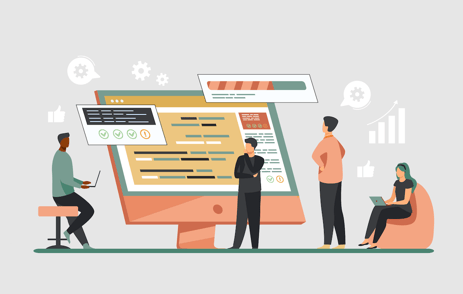In traditional professional associations, rules, protocols, and procedures are determined by a central governing body: the board. But what if associations no longer relied on a central board to run their organizations, and instead, their members made the decisions? With an anticipated rise of decentralized autonomous organizations (DAOs) coming, this could be a potential reality. As such, it’s important for association leaders to pay attention to this type of organization and the implications it may carry for their own.
What are DAOs?
DAOs are fully automated systems whose code allows members of organizations to make decisions for their organization. Central governments and managers are not needed in these organizations as all rules are embedded into code. A DAO’s code is called its smart contract, which houses all rules of the organization and holds the group’s funds. Changes to the rules can only be made if voted on by members. When a rule is passed, the code is updated automatically to reflect the changes. Bitcoin is an example of a DAO.
Ethereum describes DAOs as “an internet-native business that’s collectively owned and managed by its members.”
Funding for DAOs is also autonomous, as it is based on crowdfunding and tokens for membership. As with other rules within the organization, all funding decisions are made by vote of its members. This eliminates the need to trust a central governing body or individual within the group to make decisions regarding its funds. Additionally, all decisions are recorded and encoded on a blockchain, creating visibility and transparency into all transactions and changes.
How Might DAOs Affect Traditional Associations?
In traditional associations, membership policies and opportunities are typically set by the board, who holds the majority of power to make decisions for the group. But with any organization run by humans, there is room for error and disagreement within the group when decisions are made from the top down.
Enter DAOs.
Because DAOs rely on collective group governance instead of a traditional hierarchical structure, their members have more decision-making power, which could be preferable for many people.
Instead of joining a traditional association of like-minded industry colleagues, potential members could elect to organize their own, global interest-based DAO. Because they can regularly establish their own rules, members would have a more vested interest in the DAO and its operations. Members wouldn’t even need to know each other or create a centralized governing body. Further, all aspects of the new association would be fully transparent, including voting processes and funding decisions, so members may feel more secure in investing their time and funds into the organization.
Aside from voting power, members may feel more in control of their membership in these DAO associations as their fee for entry not only grants them access to a group of like-minded individuals, but also partial ownership of the group. As DAOs are digitally run, membership fees and donations can be collected from anywhere in the world, and members would decide how to spend donations.
Limitations and Disadvantages of DAOs
As with any new technology, DAOs face a number of limitations that will need to be resolved before widespread use is feasible. These include organizational, legal, and security issues.
Organizational issues
Since DAOs rely on member voting for decisions, operations are slower because decisions take longer to make.
Additionally, the token-based structure could also become problematic. It is possible for some members to invest more in the DAO and own the majority of tokens, giving them the majority of decision-making power within the organization. In these situations, DAOs would end up running similarly to traditional organizations with centralized governments.
Legal issues
Though DAOs currently exist, they are not recognized legally by any government yet. This creates uncertainty as to how they would be treated by courts if they were to be sued by members or outside individuals.
Security issues
If there are security holes in the initial coding of a DAO’s smart contract, they cannot be corrected until the majority of members vote on it, which could take a significant amount of time. The time it takes to recognize and patch a security gap could provide hackers with ample time to infiltrate the entire group.
While DAOs are still in the early stages of large-scale development, the many benefits of DAO membership could drastically impact how consumers and members interact with organizations in the future. It’s not time to completely restructure the traditional association model yet, but it’s important for association leaders to stay on top of trends like DAOs to understand the changing landscape of organizations.

September 6, 2021


